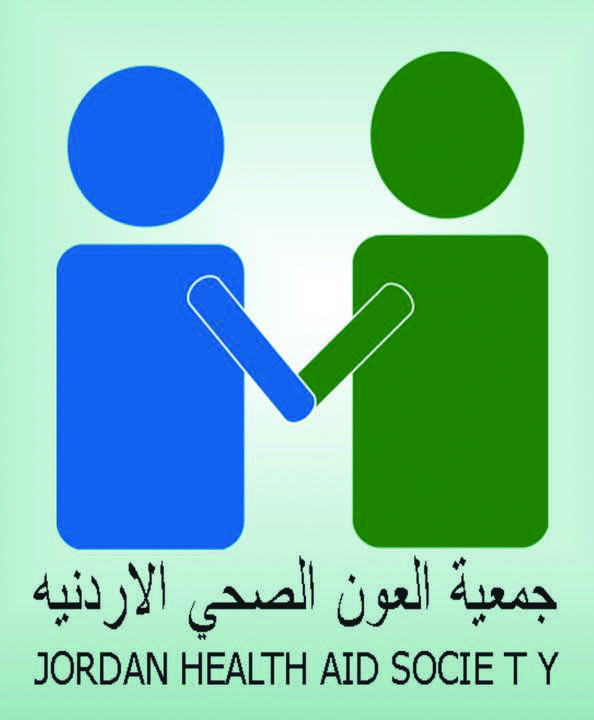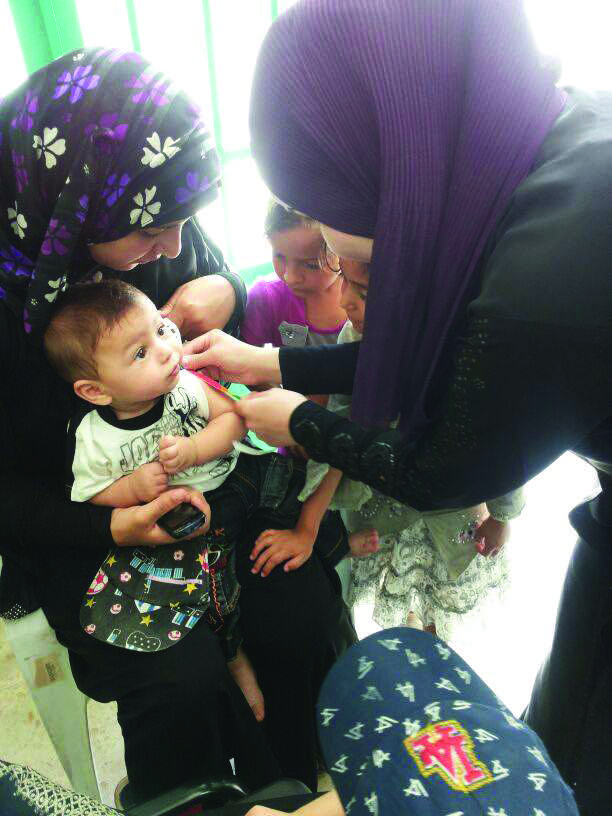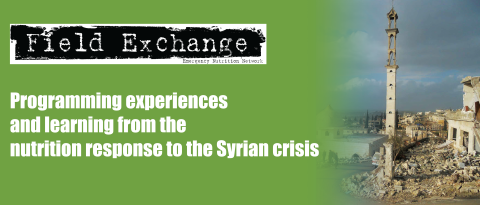Jordan Health Aid Society (JHAS)
| Name: | Jordan Health Aid Society (JHAS) | Year founded: | 2005 |
| Address: | Um Mutawe Alaslameah Street, Jandweel, building number 69, Amman, Jordan | CEO/President: | Dr. Yaroup Al-Ajlouni |
| Phone: | +962 795640906 | No. of HQ staff: | 70 |
| Email: | president@jordanhealthaid.org | No. of staff in Jordan (not HQ): | 535 |
| Website: | http://www.jordanhealthaid.org/ | No of staff outside Jordan: | 290 |
 By Tara Shoham, ENN volunteer
By Tara Shoham, ENN volunteer
In April 2014, the ENN interviewed Ruba Abu Taleb, Nutrition Coordinator with JHAS, about the agency. Ruba joined JHAS in January 2013 as a nutrition coordinator for the JHAS/Medair CMAM/IYCF1 programme. She is a Jordanian national and has a degree in Human Nutrition and Dietetics. You can read about JHAS’s nutrition programming in this edition of Field Exchange.
When was JHAS set up, by whom and why?
JHAS is a national non-profit, non-governmental organisation (NGO) serving and supporting the local community in Jordan and the Middle East and North Africa (MENA) region. It was founded July 20th, 2005 by a medical doctor who was experienced in humanitarian work. It was established not due to a specific crisis situation but to provide medical and health services to disadvantaged population groups in Jordan and the MENA region. This includes spreading awareness on healthy living and disease prevention. The main sectors we work in are health, non-food items sector and shelter.
How does JHAS operate?
JHAS provides humanitarian services through partnership agreements with different United Nations (UN) agencies and other international agencies. For example, through UNHCR, JHAS provides primary healthcare and facilitates secondary life-saving healthcare and health services to refugees in Jordan. The well-established JHAS/UNHCR system is the only referral system for secondary healthcare for the Syrian refugees in Jordan. It comprises a central referral hub and an affiliated network of hospitals. In practice, JHAS liaises with around 17 agencies working in primary healthcare seeking hospital case referrals. As needed, additional funding support is sought from the Emergency Relief Fund (ERF)/OCHA to support the capacity of the existing JHAS/UNHCR system
A key partner of JHAS on nutrition in the Syria response is the NGO MEDAIR; JHAS implements the technical plan provided by MEDAIR to provide nutrition services to vulnerable population groups in Jordan. JHAS is the implementing partner for MEDAIR on UNICEF and WFP programmes of work, specifically IYCF and supplementary feeding programming. JHAS is also an implementing partner of both International Medical Corps and Johanniter International, which activities include medical evacuation of refugees and distribution of non-food items.
 How is JHAS funded?
How is JHAS funded?
JHAS does not receive public donations; international agencies provide JHAS with implementation plans and associated funding, and JHAS provides the space and the staff for the implementation of those programmes. JHAS also directly solicits funding from the ERF in response to calls for proposals.
How many and what is the professional mix of JHAS staff?
JHAS has more than 1,000 employees distributed throughout different JHAS centres. Staff include medical doctors, general practitioners and specialists, pharmacists, nutritionists, nurses, psychotherapists, and other non-medical staff who support management and information exchange, logistics, reporting and patient registration issues. At JHAS, staff are classified as management (logistics, finance, and human resources) or programmes (implementation and direct management).
Does JHAS operate outside Jordan?
Under its emergency response mandate, JHAS is present within Syria providing emergency, primary and secondary medical care. JHAS is also registered and approved in Egypt and Dubai. JHAS had completed emergency deployments in the Gaza strip, Libya and Darfur at the time of those conflicts. Within these countries, JHAS provided medical support through field hospitals and assisted in building the capacity of local health workers to launch health aid response for their countries.
Has JHAS grown in size since the influx of Syrian refugees?
Since 2009, JHAS has had a partnership agreement with UNHCR for the provision of primary and secondary health aid to Iraqi refugees in Jordan. However, in partnership and with continual technical support from UNHCR, JHAS staffing has increased significantly by several hundred in 2011 in order to respond adequately to the Syrian crisis. Even before Za’atari camp opened, Syrians had started to cross over into Jordan. Ever since the JHAS/UNHCR Syrian response programme was launched, JHAS has provided primary healthcare via static and mobile clinics and facilitated referral for advanced medical care for the Syrian refugees in Jordan. Static JHAS clinics have always been (then and now) located at vital points in different governorates, e.g. Irbid, Mafraq and Amman. JHAS also has mobile medical units which ‘wander’ throughout southern areas of Jordan.
With the opening of Azraq camp (April 2014); there have been calls at health sector level in Jordan for contingency plans to deal with an expected large influx of refugees to the camp. Due to the success of the JHAS/UNHCR system in managing patients’ referral for advanced medical care, it is also the designated system for managing Azraq patients’ referrals.
Did JHAS’ nutrition work only begin with the influx of refugees from Syria?
The JHAS nutrition programme comprising CMAM and IYCF support was launched in January 2013. Before that, health and nutrition education messaging was the extent of our nutrition work with those attending JHAS clinics. Through 2013, the nutrition component of JHAS health services became better defined and gradually other programmes have been developed and integrated into the services, such as management of severe acute malnutrition (SAM) (partnered with UNHCR), management of MAM (MEDAIR-WFP), and management of iron deficiency anaemia in pregnancy. This has been established alongside the ongoing IYCF programme (MEDAIR-UNICEF). Most recently, JHAS participated in the nutrition survey involving UNHCR, UNICEF, WFP, Centres for Disease Control & Prevention (CDC) and implemented by MEDAIR in partnership with JHAS. JHAS participated in supervising teams and the data collection component of the survey. At the Nutrition Working Group level, JHAS has also participated in drafting the operational guidelines for CMAM and for anaemia management.
How did JHAS become the implementing partner on acute malnutrition in the Jordan response?
Through our participation in national health sector meetings and our awareness of all health sector activities, JHAS proposed to implement the CMAM/IYCF programme in 2012. Since then, JHAS and MEDAIR have worked jointly to support different nutrition activities.
How would you describe the culture of the organisation?
As can be seen from the mission statement, the inherent culture of JHAS is to provide medical and health services to vulnerable population groups with non-profit aims. JHAS therefore continuously searches for opportunities for national and international cooperation with different NGOs and UN agencies.
JHAS staff remain in need of further capacity building and technical support, especially in relation to adapting to particular contexts where there is a need to provide health support and adhere to strict humanitarian guidelines. Therefore, training has been regarded as an integral part of the JHAS recruitment and employee evaluation process.
How would you describe the culture of the international organisations that have ‘arrived’ in response to the crisis? Are there any challenges to working with the international agencies or knowing what is going on?
Currently in Jordan there are many different agencies working and responding to the Syrian crisis. A challenging feature of the current situation is the rapidly increasing demand of health facilities and health workers themselves. Once JHAS and other agencies agreed on unified working schemes, the challenges remained purely technical and these were always quickly resolved.
International agencies acknowledge the fact that they have access to educated staff to work with in Jordan. In many other countries, they have had to implement programmes themselves but in Jordan they are able just to participate in recruiting key local staff to oversee programmes. There have occasionally been cultural differences. For example, the IYCF programme prompted disagreements regarding how acceptable it is to have a mother on a poster exposing a large area of her breast while breastfeeding. On the whole however, international agencies have worked constructively and productively with JHAS.
1 Community based management of acute malnutrition/Infant and young child feeding


